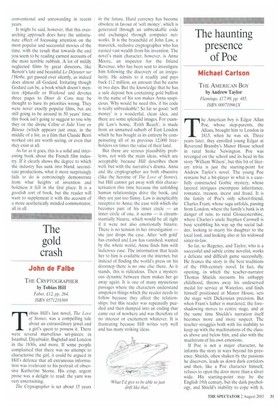The gold crash
John de Falbe
THE CRYPTOGRAPHER by Tobias Hill Faber, £12, pp. 264, ISBN 0571218369 Tobias Hill's last novel, The Love of Stones, was a compelling tale about an extraordinary jewel and a girl's quest to possess it. There were several marvellous set-pieces: in Istanbul, Diyarbakir, Baghdad and London in the 1830s, and more. If some people complained that there was no attempt to characterise the girl, it could be argued in Hill's defence that all extraneous information was irrelevant to his portrait of obsessive Katherine Sterne. His crisp, urgent prose was a delight to read; the yarn was very entertaining.
The Cryptographer is set about 15 years in the future. Hard currency has become obsolete in favour of 'soft money', which is generated through an unbreakable code and exchanged through computer networks. It is the brainchild of John Law, a maverick, reclusive cryptographer who has earned vast wealth from his invention. The novel's main character, however. is Anna Moore, an inspector for the Inland Revenue, who has been sent to investigate him following the discovery of an irregularity. He admits to it readily and pays back £12 million, an amount that he earns in two days. But the knowledge that he has a safe deposit box containing gold bullion in the name of his son makes Anna suspicious. Why would he need this, if his code is really unbreakable? So far so good: 'soft money' is a wonderful, clean idea, and there are some splendid images. For example Law's home, 'Erith Reach', is made from an unnamed suburb of East London which he has bought in its entirety by compensating all of its previous 12,000 freeholders six times the value of their land.
But there are serious plausibility problems, not with the main ideas, which are acceptable because Hill describes them well, but with the narrative's drama. Anna and the cryptographer are both obsessive (like the heroine of The Love of Stones), but Hill cannot get away with thin characterisation this time because the unfolding human relationships drive the book, and they are just too flimsy. Law is inexplicably receptive to Anna; the ease with which she becomes part of his inner circle — an inner circle of one, it seems — is circumstantially bizarre, which would be all right if it were not also emotionally bizarre. There is no tension in her investigation — she just drops the case. After 'soft gold' has crashed and Law has vanished, wanted by the whole world, Anna finds him with ludicrous ease. The information that leads her to him is available on the internet, but instead of finding the world's press on his doorstep there is no one else there. As it stands, this is ridiculous. Then a mysterious dynamic between them makes her go away again. It is one of many mysterious passages where the characters understand unspoken things which the reader needs to follow because they affect the relationships: but this reader was repeatedly puzzled and then dumped into an ending that came out of nowhere and was therefore of no interest or excitement whatever. It is frustrating because Hill writes very well and has many striking ideas.


























































 Previous page
Previous page